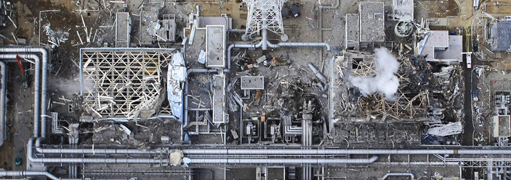A year ago the Japanese nuclear reactor complex at Fukushima was hit with an earthquake and a tsunami. It fell apart, went critical and had to be shut down. We have just passed the anniversary of that cataclysm, but in its aftermath, the issues it raises about nuclear safety have only drawn minor attention from national press and the energy czars who set U.S. policy. That’s playing with fire.Nuclear regulatory officials have been quick to calm public concern that anything like the Fukushima disaster could ever occur at any of our American reactors. In fact the Obama administration seems determined to move ahead with approval for the construction of nuclear power plants in this country, the first to be built in more than a decade. They suggest lessons learned from the Japanese debacle will make our own plants safer, that our plants are protected from tsunamis, that oversight will protect us. This, even though the U.S. Nuclear Regulatory Commission is being criticized for not implementing safety reforms recommended by its own task force.For a sobering and emphatic counter-argument, I would suggest Americans take a look at Greg Palast’s latest book, Vultures’ Picnic . But be warned: It will upset you. I found I wasn’t able to read more than three pages in a sitting—it made me that angry. It’s also written in a choppy, nonlinear style, a first-person narrative that hops around like a paperback private detective novel. Still, it contains enough dynamite investigative reporting to keep the reader hooked and furious.Palast is the quintessential burr under the saddle, the reporter who delights in poking holes in conventional wisdom. He was the investigator who blew the whistle on the Republican voter suppression efforts, which made the 2000 election close enough for the Supreme Court to elect President George W. Bush. And he also documented the 2004 shenanigans in Ohio that re-elected Dubya. But he’ll expose foolishness wherever he finds it, and Vultures’ Picnic goes after Obama’s crew with every bit as much vigor as when he exposed the missteps of the previous Republican power-brokers. Indeed, he posits that big energy doesn’t care one bit which party is in power: It subverts and controls both. He also demonstrates convincingly that the nuclear biz is identical to the oil biz, that the same companies control both all over the globe. He shows that the reckless disregard for the public’s safety that created the Exxon Valdez spill and the BP Gulf explosion is at the root of the Fukushima catastrophe. And it will be the cause of whichever American nuclear reactor debacle occurs next.The book is especially disquieting because Palast provides example after example of multinational corporations creating horrendous, murderous disasters and then simply walking away from them and letting the public pay the bill. The lesson learned from Exxon Valdez was apparently to do exactly the same thing in the Gulf deep water drilling rigs: Draw up a nice paper plan for how to respond to a spill but save a buck or billion by never actually buying the equipment or hiring the man power required. No matter how reckless its behavior, a mammoth energy company will never have to pay the price for its irresponsibility. The public will. It is a lesson the nuclear industry has thoroughly enjoyed internalizing—corporate socialism protecting private capitalism.The reason the reactors at Fukushima so utterly failed, Palast contends, is that they have a fatal design flaw. That exact flaw is built into every American nuclear reactor, the ones on line today and the ones still on the drawing board. In the event of an earthquake or flood, or whenever an outage occurs that makes the usual cooling system inoperable, emergency diesel generators are supposed to kick in, preventing meltdown. The problem is that the GE-built diesel generators cannot get up to sufficient speed fast enough to do the job without shattering their crankshafts. In Palast’s words, “My suspicions took me to a darker hypothesis. In my gut, I believed that the diesels were never expected to work, can’t work. Not anywhere; not in Japan, not in the United States, not in Russia, nowhere. That means every nuclear plant built or about to be built doesn’t stand a chance in a power outage emergency.”During its just-concluded session, the Legislature passed a tax break requested by Gov. Susana Martinez. The enriched fuel rods that Urenco will be producing at its $2 billion plant in Lea County won’t be subject to gross receipts taxes. Those rods are destined for nuclear reactors nearing the end of their designed life spans and for those the Obama administration is pushing to have built in the near future. If Palast’s exposé is correct, it would be better if there weren’t much of a market for those enriched fuel rods. Regrettably, the lesson of Fukushima, like the lesson of Exxon Valdez, seems destined to be ignored. Far, far too many fuel rods produced near Eunice, N.M., will be sent around the world. Each one could become a part of future disasters.
Jerry Ortiz y Pino is a retired social worker, community activist and college instructor. He is in his second term as the Democratic state senator for District 12 in the New Mexico Legislature. Email jerry@alibi.com
The opinions expressed are solely those of the author.





